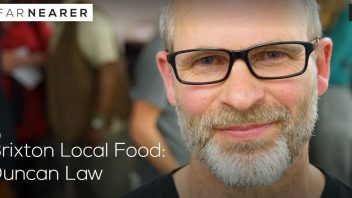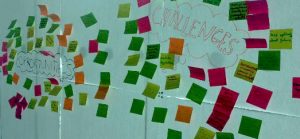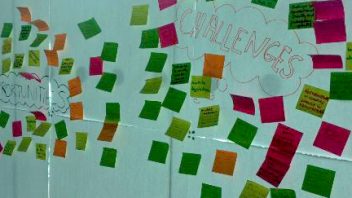Resource yourselves

Building the capacity of your group
Whether you are taking on a Leadership Project, or an Economic Enabler, we suggest there are 3 things that will help build your capacity to do this work well – money, enough people with the right skills, and the support of others, as outlined below.
1. Money
Many things can happen without money – the success of Transition has proven this beyond a doubt. This includes a number of economic or business projects and enterprises that are thriving off the back of volunteer time and passion. However we are continually told that one of the main barriers to progress is lack of capacity.
If you want to take a leadership role in the challenge of transforming your local economic system, this is a significant, long-term programme of work. It requires a lot of effort, some specific skills and a lot of support to maintain momentum, enthusiasm and sanity! We strongly recommend you consider raising some funds to enable you to pay people to do this work, and especially the person doing the overall co-ordination role.
For example, it cost around £15,000 (roughly 75 days effort, plus some costs) to deliver each of the 3 Economic Evaluation pilot projects. Then, more fundraising activity is needed to implement the suggested projects in the strategic plans.
Your initial intent might be to raise funds in order to pay someone to raise more funds! This approach worked well in the early days in Totnes, where a local person donated £5,000 and the core group decided to use this to pay someone to fundraise for specific high priority projects. This turned the £5,000 into over £80,000 and started to create a solid track record of successful, funded projects, which in turn helped win further funding.
It will usually strengthen your funding bids if you can show you have credible partners involved, a clear approach underpinned by a good evidence base, and a track record. It can take at least 3-6 months (usually longer) to secure funding, so start this as soon as you can. It’s also a good chance to practice becoming resilient to rejection, as chances are a number of your bids will fail.
The key question is what are you going to fundraise for? Usually you need to define your proposed project in some level of detail, in order to give your potential funders the information they need. This includes project aims and objectives, the problem you are addressing, planned approach, desired outcomes and outputs, benefits, budget etc.
There are other things worth considering when defining your project, like the maturity and track record of your group in delivering similar activity, and balancing ambition with not taking on too much too soon.
Things to get you started
- Read the TN Funding Primer
- Listen to this webinar from Transition-savvy fundraising experts
- Talk to your local CVS office to help find potential funders in your area
Strengthening
- Keep an eye out for useful resources emerging from the Resourcing REconomy course
- Useful advice on creating a fundraising strategy from Funding Central.
2. People and skills
As with all projects, some of the most important aspects are the enthusiasm and passion of those involved. If their hearts don’t sing with joy with this kind of work, then it’s unlikely to fully succeed. Besides singing hearts, they also need to have the right skills, clarity over roles & responsibilities, and enough time. These things help ensure your project team has a positive experience, rather than one of stress and burnout.
The required skills depend on your project’s needs. If this involves partnership working, then someone in your team will need to be comfortable and credible in talking to senior people in key organisations e.g. the council, business groups, schools and colleges and so on. They need to be able to engage in a professional capacity, and be able to look the part and speak the language of these typically more mainstream institutions, if they want to get and hold their attention.
In addition to these ‘professional’ business skills, you might need team members with some understanding of your local economy, its problems, and the potential solutions. Or this might be a skill/knowledge base you intend you build.
Then you need someone who’s a good manager, who can run a project to time and to budget (your funder will want assurance of this too). It also helps to have someone who’s a good networker, who knows people and who is connected and understands the local organisational/power landscape, and even helps you access it.
There’s also some more general skills that are utterly essential, such as designing and facilitating good events, providing catering and doing the administration of the project (tracking spend and paying invoices for example).
Sometimes many of these skills can be found in one person. However, given the scope of typical Economic Enabler and Leadership Projects, we strongly recommend that you build a small, multi-skilled team of at least 2-3 people. This helps bring a diversity of perspectives and experiences, and provides the mutual support that’s so critical when things get tough, which they will at some point!
The challenges of good team initiation, dealing with conflict and maintaining momentum are the same as for any group. Some of these people will likely be volunteers, and some will be paid if you have raised funds – this can raise tricky issues if not handled well.
Besides building a small project team, many of the Economic Enabler projects, and certainly the Leadership Projects require working with a group of external organisations – this external group and its dynamics will also require initiation, care and attention. This is discussed further in the Partnership section.
Things to get you started
- Here’s a sample of a simple project worker brief
- A Transition guide to introducing paid work to your group, including job definitions & recruitment
Strengthening
- Short video on skills needed for Economic Evaluation projects
- The TN effective groups canvas helps you think about how your project team will work
3. Gaining the support of the rest of your TI or group
REconomy work often cuts across, and has relevance to, many of the typical theme/working groups we find in Transition initiatives and groups. So it’s a good idea to take your proposal for your local REconomy project around your sub-groups and give everyone a chance to understand and discuss your ideas, and see where things might fit together. Otherwise toes may feel stepped on, and misunderstandings can arise.
You may also find some resistance to any part of your TI engaging with business and economics. Some people may see this as selling-out – though this is usually due to a misunderstanding about the aims of the REconomy work. When they find out more about the types of enterprises that we want to grow, and the kind of economic system we want to develop, these concerns are usually addressed.
To gain internal support, you’ll want to have a good understanding of why you want to do your local REconomy activity, what you plan to do, with whom and so on. It’s also good to be able to answer things like: how does this further the aims of your TI? Are there any risks? How does this impact other projects?
Here’s some perspectives from Transition Town Totnes, and Transition Town Brixton about their reasons for starting a local REconomy Project, and stepping up to a leadership role:







Connect